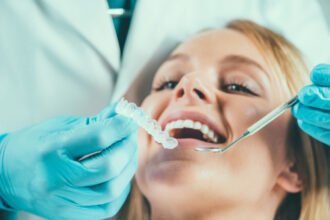Genes play a huge role in your life, influencing everything from your predisposition to certain diseases to your physical appearance and personality. Of course, you’re probably already aware of this fact, especially if your kids look exactly like you did at their age. Did you know that parents can pass on dental issues, though? Often, oral health shares a close link with DNA so, if you deal with a slew of oral health issues, odds are your kids will, too.
In fact, a study of more than 500,000 people revealed 47 areas of the genome linked to dental caries. Here are just a few ways these genes can affect oral health.
1. Saliva Production
One way genetics impact your oral health is by means of saliva production. If your parents happen to have more saliva, you likely will, too. In general, saliva works to flush particles from your mouth and teeth and even helps digest food. On a micro level, however, saliva does much more. Enzymes fight off infection and contain proteins and minerals that protect the surface of your teeth from plaque buildup.
Thus, a good flow of saliva will help prevent gum disease and decaying tooth enamel. However, if your genes determine you have little saliva, you may be more likely to suffer from xerostomia, resulting in dental caries, sensitivity, infections and difficulty swallowing or speaking in some cases.
2. Tooth Decay
Certain forms of the gene beta-defensin 1 might also play a role in the rate at which you tend to develop cavities. This gene determines how strong your immune response will be when germs invade your mouth. If yours can’t mitigate bacterial colonization, you’ll probably experience tooth decay and dental caries more frequently than those with a strong beta-defensin 1 gene.
However, some scientists argue that lifestyle choices have a bigger effect on whether or not kids suffer tooth decay. In a study of identical twins with the same genomes, there was tooth decay of varying levels. Thus, environmental factors must have been responsible for this difference.
3. Teeth Position and Bite
Having crooked teeth doesn’t necessarily mean your child will need braces, but they will be more likely to have crooked teeth. If your little ones do end up with overlapping or crooked teeth, they’ll be more difficult to brush, thereby increasing the likelihood of plaque buildup and infection. Moreover, if they have an over or underbite, their enamel may wear down quicker, leaving the dentin exposed to bacteria and other harmful microorganisms.
4. Gum Disease
Nearly half of adults over the age of 30 have gum disease, an infection that leads to sore, bleeding, sensitive gums and even tooth loss in more serious cases. One of the determining factors may be genetics. Moreover, people more at risk of developing periodontal disease also had genetic signatures linked to poor metabolism, negative personality traits and cardiovascular complications. Thus, dental health may affect overall health, genetically — and vice versa.
5. Thin Enamel
Genetics may also cause the enamel on your teeth to thin, hindering the growth of you or your child’s teeth. For instance, amelogenesis imperfecta is a genetic disorder that causes defects in enamel, making teeth more susceptible to breakage and rapid wear. Additionally, disorders in tooth development, like ectodermal dysplasia, can result in malformed and missing teeth at birth.
Those with this hereditary trait can minimize this risk by limiting their intake of acidic beverages and foods. Additionally, you might eat more green, leafy vegetables and begin taking supplements to support strong bones and teeth.
6. Oral Cancer
This year, more than 53,000 people will develop oral cancer and 20% of them will die as a result. While habits like smoking and poor diet can increase your likelihood of getting cancer, genetics also play an important role. Certain mutations and syndromes, including Fanconi anemia and dyskeratosis, are a result of hereditary abnormalities. Recently, scientists have found that mutation in the p53 gene, in particular, is one of the most common causes or oral cancer.
Lifestyle vs. Genetics
While scientists are beginning to understand the link between genetics and the above oral complications, much remains a mystery. Some connections are unclear and require further research before determining whether certain genes cause additional oral health problems.
Still, even after scientists discovered these few causal connections, they still agree that lifestyle choices have just as big of an impact on dental health as genetics. After all, even those whose genetics don’t predispose them to oral cancer can develop it by smoking or chewing tobacco, being obese or failing to maintain a brushing and flossing routine. While parents don’t pass these bad habits down to their children through their blood, kids still tend to follow in thei footsteps.
Therefore, whether you have genetic predispositions, bad habits — or both or neither — you’re passing down your oral health to your children. Ensure their mouths are healthy ones by adopting healthy habits, a balanced diet, a regular hygiene routine and initiating conversations about dental health with your little ones. Then, even if they do have genetic risk factors, the likelihood of them having poor oral health will be much lower.






